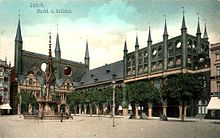German Studies Day
Germanistentag is the name of two meetings in 1846 and 1847. The close times scientifically oriented German Germanistentag other hand, is every 3 years by several decades the German Association of Germanists aligned.
meaning
In 1846 the conference was in Frankfurt am Main , in 1847 against the background of the Schleswig-Holstein question and as the success of a renewal group in Lübeck, now known as Jung- Lübeck . The outbreak of the March Revolution prevented further Germanist days. They were an initiative of German university scientists in the course of developing a German national feeling. In contrast to today, the term German studies had a broader meaning in the Vormärz : It connected historians, lawyers, and linguists and literary scholars who dealt with German history, German law and the German language.
Participants in the Germanist Days in the 19th century included not only linguists, but also more legal scholars and historians. The meeting of Germanists is therefore also seen as the forerunner of the German Juristentage , which has been taking place regularly since 1860 . The Germanist Days in the 1840s were preceded by other events with a scientific and national focus, such as the Gutenberg Festival in 1840, the celebration of the thousandth anniversary of the Treaty of Verdun in 1843 or Luther's three hundredth anniversary of death in 1846.
Germanistenag 1846 in Frankfurt
At the first Germanistenag initiated by the Tübingen lawyer August Ludwig Reyscher in Frankfurt in 1846, Friedrich Christoph Dahlmann , Georg Waitz and Johann Gustav Droysen spoke about the indivisibility of Schleswig-Holstein . Jacob Grimm talked about the value of imprecise science , his brother Wilhelm about the German dictionary . The conferences were held in the Römer in Frankfurt.
Germanistenag 1847 in Lübeck
In 1847, lectures on the national significance of the Hanseatic League , the German colonization in the east and the renewal of the German court system were held at the Germanistenag from September 27 to 30, 1847 under the direction of Jacob Grimm in Lübeck . The conference venue was the Reformed Church built in the style of revolutionary architecture . On the last day, Hofrat Heinrich Karl Jaup from Darmstadt demanded general German citizenship as a step towards the spiritual unity of Germany. Heinrich von Treitschke described the Germanists' assembly in Lübeck as an "intellectual state parliament of the German people". The event ended with a banquet in one of the vaulted cellars of the Ratskeller zu Lübeck under the Lübeck town hall , which has since been called the Germanist cellar .
Planning of the Germanist Day in Nuremberg in 1848
In 1848 the Germanistenag was to take place in Nuremberg. Jacob Grimm asked King Ludwig I of Bavaria for his permission. Ludwig granted this and conveyed his appreciation to the scientist.
“I was pleased to have received this from you, such an excellent scholar. It is with pleasure that I grant my approval… and am anbey with sincere, appreciative sentiments, your well-inclined Ludwig. "
However, because of the revolution of 1848 and the activities of the National Assembly, this Germanist Day did not take place.
Aftermath
Many of the participants in the Germanist assemblies became members of the Frankfurt National Assembly in 1848 .
German Association of German Studies
The German Association of Germanists, which has been organized every 3 years by the German Association of Germanists for several decades , is a forum for academic and public discussion of the goals of German studies and German teaching. In 2013 this took place at the Christian Albrechts University in Kiel; In 2016 at the University of Bayreuth with the topic of "storytelling" and most recently in 2019 at the University of Saarland with the topic of "time". The Berlin Germanistenag in 1968 became legendary when the involvement of well-known professorships in National Socialism was discussed.
literature
- Dietrich von Engelhardt: The Germanists' meeting 1847 in Lübeck. In: Der Wagen 1988, pp. 76–90. Lübeck 1988 ISBN 3-87302-048-3
- Antjekathrin Graßmann (Ed.): Lübeck Lexikon. Lübeck 2006. ISBN 379507777X
- Gustav Radbruch , Hermann A. Stolterfoht: The Lübeck Germanist Assembly. In: Ehrengabe, presented to the German Juristentage by the Association for Lübeck History and Archeology , Lübeck 1931, pp. 103–121; reprinted in: Gustav Radbruch: Kulturphilosophische und Kulturhistorische Schriften. (Complete edition, Volume 4) Heidelberg: CF Müller 2002 ISBN 9783811421561 , pp. 246-260
- Hans-Ulrich Wehler : German history of society. Second volume: From the reform era to the industrial and political “German double revolution” 1815–1845 / 49 . CH Beck: Munich 1987. ISBN 340632262X
Web links
- Full-text digitization of the negotiations of the Germanistentage in the Encyclopedia of Romantic Nationalism in Europe
Individual evidence
- ↑ These Germanists saw themselves as "German lawyers" in contrast to the so-called historical school of law with a focus on Roman law ; so the supporters of Roman law stayed away from the event.
- ↑ Wehler, p. 407
- ↑ J. Grimm: On the value of imprecise sciences (excerpts)
- ^ W. Grimm: About the German dictionary
- ↑ The demands were initially aimed at the public and the orality of the proceedings. In criminal cases, jurors and lay judges were weighed against each other. The demand for the jury claused the demand for parliament .
- ↑ See also: Karl Wippermann: Jaup, Carl . In: Allgemeine Deutsche Biographie (ADB). Volume 13, Duncker & Humblot, Leipzig 1881, pp. 733-736.
- ↑ Dieter Henning, Bernhard Lauer (Ed.): 200 years Brothers Grimm . Documents of her life and work. Kassel 1985, p. No. 792 .
- ↑ Super User: Deutscher Germanistentag 2016. (No longer available online.) In: www.germanistentag2016.de. Formerly in the original ; accessed on June 15, 2016 . ( Page no longer available , search in web archives ) Info: The link was automatically marked as defective. Please check the link according to the instructions and then remove this notice.
- ↑ 26th German Association of Germanists. Retrieved September 21, 2019 .

